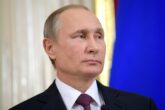January 13, 2025
In Russia's Perceived War with the West, Arms Control is Collateral Damage
As Russia’s full-scale invasion of Ukraine approaches its third anniversary, relations between Moscow and the West have continued to deteriorate. Following the White House’s approval in November of Ukrainian strikes inside Russia with U.S-supplied ATACMs, the Kremlin once again escalated its nuclear threats, formally updating Russian doctrine to lower the threshold for nuclear use in response to a subjectively determined threat to sovereignty and territorial integrity. This latest threat fits into a pattern of more aggressive nuclear posturing from Moscow following the full-scale invasion—including a systematic dismantling of the arms control regime.
The most glaring example is New START—the last remaining treaty between Russia and the United States that sets restrictions on nuclear weapons. Though the March 2021 agreement to extend the treaty was a notable achievement, things quickly took a turn for the worse after the February 2022 full-scale invasion. After first refusing to submit to on-site inspections in the summer of 2022, Moscow later cancelled its participation in the New START Bilateral Consultative Commission meeting that November. The most decisive step came the following February, when Moscow officially suspended its participation in the treaty. Russia has since signalled its disinterest in negotiating a successor to New START following its expiration in 2026, having rejected a U.S. proposal at the start of this year for bilateral conversations on a new treaty without conditions. Moscow’s destruction of the arms control regime also extends to the conventional domain, having formally withdrawn from the Conventional Armed Forces in Europe (CFE) Treaty in November 2023.
Russia seemingly perceives previously established arms control agreements as elements of the broader Western-dominated political and security order that it aims to overturn.
Russian Foreign Minister Sergey Lavrov justified rejection of the U.S. offer to resume a strategic arms control dialogue by arguing that “the United States has cast aside the principles on which our countries once agreed to establish cooperation, including on arms control”. This statement reveals the fundamental driver of Russia’s recent approach to arms control—namely, the intention to subsume it within its larger conflict with the West. Russia seemingly perceives previously established arms control agreements as elements of the broader Western-dominated political and security order that it aims to overturn. Deputy Foreign Minister Sergey Ryabkov made this linkage explicit when he stated in January 2023 that the condition for Russia’s return to New START compliance would be U.S. acceptance of Russian demands for security guarantees made in late 2021.
Russia’s refusal to compartmentalise arms control also stems from an assessment of its coercive value vis-à-vis the West. Assuming—not without reason—a lower risk tolerance in the West than in Russia, the Kremlin has sought to instil fear with the goal of compelling Washington and its European allies to limit support for Kyiv. By linking arms control talks with the conflict in Ukraine, Moscow has signalled to Western governments that the breakdown of these talks is the price for their involvement in the war. For Russia, then, arms control represents a key tool at its disposal to attempt to enhance its position vis-à-vis Ukraine.
Read the full article on European Leadership Network.
More from CNAS
-
The Eurasian Century: Hot Wars, Cold Wars, and the Making of the Modern World with Hal Brands
For more than 100 years, the continent of Eurasia has played a central role in global geopolitics. In the 20th century, numerous authoritarian powers from Germany under Kaiser...
By Andrea Kendall-Taylor, Jim Townsend & Hal Brands
-
Putin’s Fight Won’t End With Ukraine
In an essay for Foreign Affairs, titled “Putin’s Point of No Return,” Andrea Kendall-Taylor, senior fellow and director of the Transatlantic Security Program at the Center for...
By Andrea Kendall-Taylor
-
Trump’s Callout of Russia’s Vladimir Putin Is Raising Eyebrows
President Trump is threatening sanctions and tariffs on Russia if Putin doesn't reach an agreement to end the war in Ukraine. Some are surprised, considering Trump's affinity ...
By Andrea Kendall-Taylor
-
Tehran’s Proxies Are on the Back Foot. An Iran-Russia Defense Pact Could Revive Them.
A renewed defense treaty between these two powers will render Iran’s web of proxies all the more dangerous by arming already destabilizing agents with more advanced weapons te...
By Delaney Soliday & Shivane Anand




